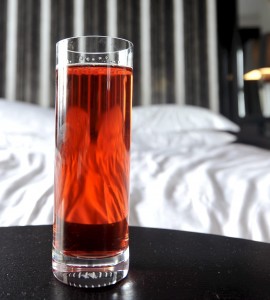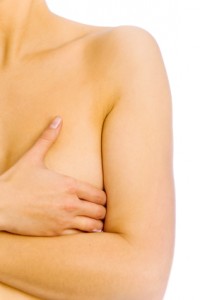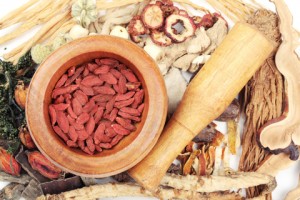Wednesday Bubble: More on breast tenderness, hormone replacement and breast cancer
More bad news on the hormone replacement front: if you are taking estrogen (conjugated equine estrogen) with progestin (medoxyprogesterone) for menopausal symptoms and experience breast tenderness, you may want to think twice.
Frankly, this news isn’t exactly new. Because back in 2009, UCLA researchers reported similar findings in the Archives of Internal Medicine. These newer data, provided by the same researchers at UCLA’s Jonsson Comprehensive Cancer Center and published online in Breast Cancer Research and Treatment only add to the hormone risk fodder.
The researchers say that in their research, they’ve consistently run across data that suggest that “estrogen plus progestin compared to estrogen alone, have a more marked effect on breast tissue,” possibly due to more growth, leading to greater density. According to the lead study author, Dr. Carolyn Crandall “higher breast density (has been shown to be) associated with a higher risk of breast cancer,” adding that “in women with extremely dense breasts, the cancer risk can be four to six times higher than for women whose breasts are not dense.”
In this update, Dr. Crandall and her colleagues reviewed data from the Women’s Health Initiative, specifically focusing on reports of new breast tenderness. At the study’s start, almost 12% of women taking estrogen alone or estrogen in combination with progestin reported having breast tenderness. However, by the first year, women in the combination hormone therapy group reporting onset of breast tenderness after starting hormones had a 33% greater risk of developing invasive breast cancer compared with their peers who did not have breast tenderness. And while estrogen alone also increased the risk for developing breast tenderness, the effect was less than that of the combined hormones, especially since it did not lead to an increased breast cancer risk.
So, what to make of these new data? If you are taking HRT and develop breast tenderness, you need to speak to your health practitioner, assess your risks and make a joint decision as to whether or not the benefit of fewer menopausal symptoms is worth the risk of possibly developing an invasive form of breast cancer. And if you are not yet using hormone therapy, you may just want to step back and think twice.
Buyer beware: hormone therapy is a slippery slope with bumps, bruises and perhaps serious disease. Is it worth it? Only you can decide.
Read MoreHot flashes, Traditional Chinese Medicine & JQF – it is time for an Rx change?
I am a huge fan of Traditional Chinese Medicine (TCM), having used various preparations over the past 20 years for numerous ailments. These preparations have been prescribed by a practitioner who is licensed and degreed in TCM and my experience, albeit anecdotal, has been nothing but positive. In fact, I have been using a TCM formulation for several years now to help battle numerous symptoms and in combination with other prescribed herbs, I’ve mostly won. That’s one of the main reasons that I am always intrigued when I stumble upon well-designed studies that demonstrate benefit, like this one in the journal Menopause.
A bit of context
TCM and other similar philosophies emphasizes various body systems that together, form a network or grid connected by a meridien, if you will, as well as the relationship of the body to its social and natural environment. Its primary focus on maintaining health and enhancing the body’s ability to fight off disease. TCM will not focus, for example, on treating specific pathogens but rather, on addressing non-specific factors that create disturbances or imbalances within a certain network. TCM also examines how these imbalances may occur in unique parts of a specific system, such as the heart and blood vessels and small intestine (all of which are part of the heart system) and how they change over time. Western medicine, on the other hand, focuses primarily on treating morbidities, or symptoms related to various conditions and diseases. You can read morerabout TCM in this post from last September.
In TCM, menopausal symptoms are believed to be related to a decline in yin or yang in the kidneys. One of the oldest prescriptions in TCM to reinforce kidney energy is known as ‘Qing E Fang’ (QEF) and the first record of its use dates back to the year 960. The preparation is a combination of four key ingredients that are mediated through estrogen receptors and expression, hence, its potential usefulness in menopause. (These ingredients, in case you are interested, are Cortex Eucommiae (whose bark and leaf have an antioxidant effect) Fructus Psoraleae (commonly used for bone health and to treat estrogen associated diseases), Semen Juglandis and Rhizoma Garlic.)
About the research
For this study, researchers used a formulation based on QEF known as Jiawei Qing’s Fang or, JQF, which used two of the four herbs (Cortex Eucommiae, Fructus Psoraleae) mentioned above. In JQF, they are combined with the herb, Salviae Miltiorrhizae, that has been used specifically to treat gynecological disorders and has properties that are similar to SERMs, drugs that mimic estrogen but are theoretically safer. The 72 women participating in the study were all perimenopausal and had severe and frequent hot flashes; they were randomly instructed to take JQF or placebo daily over 8 weeks. For a month thereafter, symptoms were evaluated using a menopause measure that looks at vasomotor, physical, psychosocial and sexual health). The women also kept daily diaries to record the frequency and severity of their flashes.
Notably, this is one of the first times that perimenopausal women have been the focus of a study that involves TCM. Moreover, in this study, researchers selected a formulation that worked on the kidney and also contained an herb that not only mimics SERMS but also improves blood circulation. And the findings? Women who randomly took JQF not only experienced significant improvements in their hot flashes, but also reported improvements in quality of life in terms of the impact of vasomotor and physical symptoms. Moreover, because Salviae Miltiorrhizae works on blood circulation, they also had reductions in the blood fats (triglyerides) which means that the formulation might also be beneficial in terms of heart disease prevention in menopausal women.
Is it time for a change of Rx for the change? Should you be seeking out a practitioner who can prescribe JQF and advise you on its best use for you? Or is it too early? JQF was well tolerated, although two women were found to have liver measures negatively affected in ways that did not require any medical intervention but did raise a few red flags and calls for more study. JQF represents a seemingly scientifically proven alternatives to hormone therapy. It’s refreshing to watch TCM come out of Asia and be increasingly incorporated into Western philosophy.
Flashfree…what’s it all about?
There’s a misconception going around that only women who are entering or have entered menopause should read this blog. And it’s not true. So, I thought that I’d use this opportunity to again, highlight some of the common themes and issues that run through an adult woman’s life, no matter her age:
- Health & Prevention. Women’s health is so important. And so misunderstood. While some of that misunderstanding can be attributed to an early failure to evaluate drugs in important studies, for example, heart disease, the broader issue is that women are intricately wired beings whose systems are truly integrated and connected. Our physical health is so often influenced by our emotions and environment that it can be difficult to discern cause and effect, and by default, treat appropriately and effectively. However, there are important steps that can be taken to stave off some of the unwanted effects of aging or even some diseases. Just think…exercise and heart health, bone health, mind health; a healthy diet and maintaining a healthy weight and helping prevent heart disease and diabetes; or, stress reduction, yoga, focused breathing to maintain balance and energy and promote immune health.
- Friendships and Social Support. No matter our age, situation, relationship status, creed, religion, or color we rely on our relationships and networks to raise us up and bring us out of the darkness into the light, to fully blossom, thrive and grow, to create, express and love. Just think…strengthening friendships and support networks to maintain emotional and physical health or boosting self esteem to help with career and achievement
My point is that if you are in your late 30s or 40s and premenopausal, there are many things you can do now that will benefit you later. Hard to believe, right? But truly, Flashfree is no just for the menopausal set. Flashfree is for you. And although many posts focus on menopause, there are a lot that focus on aging issues, something that all of us, for better or worse, will go through.
Read More
Wednesday Bubble: Cherry juice and sleep. Yup, sleep!
 I have to admit; when I first saw the headline I was a wee bit skeptical:
I have to admit; when I first saw the headline I was a wee bit skeptical:
“Cherry juice gives a good nights’ sleep.’
Yeah, so does a knock on the head or an Ambien. But when I delved deeper, I found myself thinking, “wow,” who knew?!
Cherry juice, namely cherries of the Montmorency variety (aka a tart or sour cherry) have been found to significantly increase melatonin levels (a hormone that regulates sleep, among other functions) in the body, hence promoting sleep. In fact, researchers from Northumbria University in the North of England report that men and women who drank at roughly an ounce of tart cherry juice diluted with water twice a day for a week actually increased the time spent asleep by 25 minutes and experienced up to a 6% improvement in sleep quality. They also reported less time spent napping during the day than their peers who drank diluted fruit juice. And, when researchers delved deeper into cherry juice qualities, they found that it actually boosted melatonin levels by as much as 16%.
What’s most interesting about this study, at least from where I sit, is that the researchers say that they were originally interested in how tart or sour cherries would help muscles recovery from strenuous exercise because sleep plays an important role in the recovery process. However, this side finding means that cherry juice “has the potential to be applied as a natural intevention not only to athletes but to other populations with insomnia.”
Mind you, this study only examined the potential of tart cherry juice in 20 people up to age 40. Me? I would like to see if it works in postmenopausal women who experience major sleep disruptions due to hormone fluctuations. But if anything, I concur that the study definitely provides us with “more evidence surrounding the relationship between how we sleep and what we consume.”
Just a bit of cherry fodder for a Wednesday.
p.s. Not sure if the cherry pie at your Thanksgiving table can supplement that turkey zzzs but it certainly can’t hurt!
Read More
Stress eating? Spare Tummy Tire? Try a little mindfulness…
Mindfulness. It keeps popping up in different areas of health. Last time I posted about mindfulness training, it was within the context of hot flashes and how training your mind to reduce stress can influence how hot flashes are experienced. But what about stress eating?
Many women (and men) turn to emotional eating when they are stressed. And unfortunately, when it comes to weight gain, many of the most serious health affects of excess weight tend to be linked to that roll around the tummy area. In fact, abdominal (or visceral) obesity produces inflammation in the body that can increase the risk for diabetes and heart disease. In women in particular, who may be prone to weight gain in their abdominal area due in part to hormone fluctuations, it’s a double-edged sword. Add the fact that chronic stress increases levels of cortisol, which in turn, mobilizes the migration of fat cells to the midsection, and well, it’s a disaster in the waiting.
As I have written previously, cortisol is a hormone that is secreted by the adrenal glands. Its primary role in the body is to regulate energy (by producing blood sugar or metabolizing carbohydrates, protein and fats) and mobilize it to areas where is it most needed so, cortisol levels tend to peak in the early morning and then gradually decline throughout the day. Research has shown, however, that women have higher cortisol levels than men, and that certain women –especially those with greater amounts of abdominal fat — may be reacting to a large disruption in the release of cortisol that causes a greater than normal difference between morning and evening levels of the hormone. This disruption is believed to be related, at least in part, to exposure to prolonged physical and mental stress. This psychological component is huge, because it tends to trigger the desire to consumption of food that is high in fat and/or sugar, which also tends to promote abdominal weight gain.
How do you break the cycle?
Researchers are now saying that mindfulness may be an important strategy to beat the bulge and the stress. In fact, whey they looked at the effects of a program that focused on interrupting habitual thoughts, emotions and behaviors, that is exactly what they found.
In this small exercise, 24 overweight and obese women not yet in menopause learned to use guided meditation as a way to introduce mindful eating (i.e. paying attention to their physical sensations of hunger, stomach fullness, taste satisfaction and food cravings). They were also taught to be more aware of emotional eating triggers and negative emotions as well as to be more loving and accepting of both themselves. Over nine weeks, they were able to share their challenges, concerns and experiences and then learned new meditations to overcome what they felt were roadblocks in their progress. During the same four week period, 23 women were placed on a waiting list for comparison purposes.
Regularly engaging in mindfulness training set these women off on the right foot upon awakening and in fact, lowered their cortisol levels in the early am hours. What’s more, women who reported having the greatest improvements in their response to stress and emotional eating triggers tended to have the largest reductions in abdominal fat. Additionally, reductions in waking cortisol levels were related to reductions in abdominal fat as well.
Mind you, the women in this particular study were premenopausal, namely because the researchers say that hormonal declines naturally lead to deposits of fat in the midsection. However, if psychological stress compounds weight gain in this area as much as it affects overall wellbeing and menopausal symptoms, it might be worthwhile considering if incorporating ‘a little mindfulness’ into one’s life could help shift fat away from the abdomen as well. It’s an interesting idea and definitely worth exploring…especially as we move into what many regard to be the most stressful and eating laden season of the year: the holidays!
Try a little mindfulness. Not only can it benefit your brain but your tummy might reap the benefits as well.
Read More









